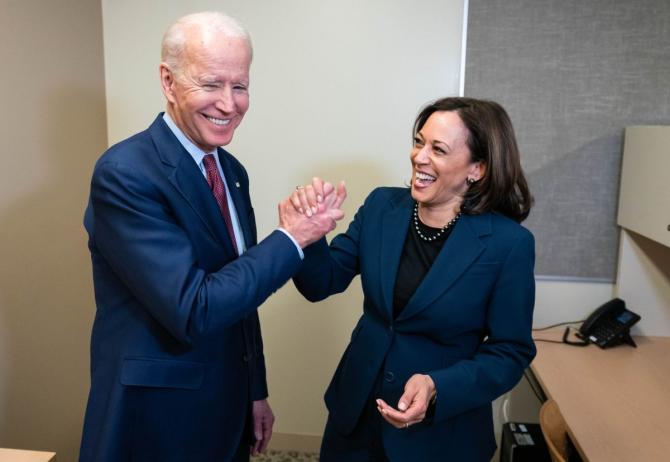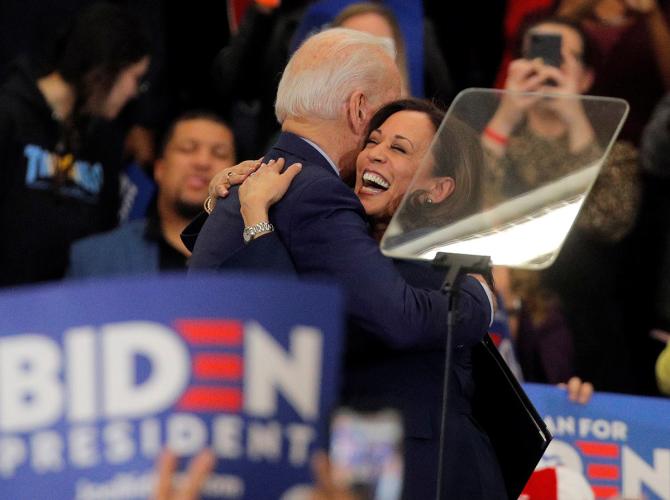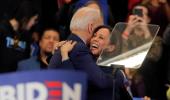'What Kamala Harris' rise and rise underscores is that our old ways of identifying the Indian-American Diaspora need to change...'
'None of this detracts from her Indian-American identity, which makes us feel as if we are Americans too,' notes Ambassador M K Bhadrakumar.

On several templates, the Democratic candidate in the November election in the US Joe Biden's choice of Senator Kamala Harris as his running mate becomes an extraordinary development.
Biden, the consummate politician, has made a thoughtful choice that adds gravitas to his campaign in what is turning out to be a momentous election.
A CNN report behind Biden's choice of Kamala Harris:
- She has been vetted on the national stage due to her own 2020 bid;
- She has experience in government -- as both the California attorney general and as a US senator since 2017;
- At 55 years old, she represents a younger generation of leader -- something that Biden, who will be 78 on Inauguration Day 2021, said was a major factor in his choice;
- She is a historic pick as the first Black and South Asian American woman to appear on a major party's national ticket;
- She's from California, a massive treasure trove of both Democratic votes and Democratic donors; and,
- She emerged as an outspoken voice on race -- and the need for police reform -- following the death of George Floyd in May and the subsequent protests it sparked around the country.
Simply put, Biden calculated it's a winning ticket; it's a historic breakthrough; it opens up huge space for progressive policies; and, of course, it inevitably says a lot about the Biden candidacy -- which is all for the good.
Unsurprisingly, President Trump used the worst epithet in his limited vocabulary to react to Kamala Harris -- that she belongs to the 'far left' (of the American political spectrum.)
However, what strikes me most as an Indian is the devastating snub this constitutes to the Sangh Pariva -- and Prime Minister Narendra Modi personally -- in regard of their transformative agenda for the country's secular democracy.
It's a huge snub as Kamala Harris is not only a progressive and represents values and ideals that the Sangh Parivar regards as repugnant and the Modi government has tried hard to squash during these six years in power since 2014.

The grotesque spectacle enacted in September last year under the rubric Howdy Modi in Houston, Texas now becomes an albatross.
Modi addressed an Indian-American audience like a Pied Piper in the folk tale assuming blithely that the Indian-American Diaspora had no mind of their own.
It was an unwarranted interference in the US domestic politics.
And it stemmed from a deeply flawed understanding of the winds of change sweeping the American political landscape.
Kamla Harris and almost all other Indian-origin Democrats boycotted the Howdy Modi event in Texas.
One reason behind this boycott was Trump's presence on the podium with Modi.
Another even more significant factor was India's security crackdown and communication blockade in Jammu and Kashmir just the previous month, which is unpopular among progressives and liberal Democrats.
Sharing a platform with Modi, barely seven weeks after New Delhi's controversial action in the troubled Valley, would have been seen as an implicit endorsement of his government's Kashmir policy.
The acolytes of the Indian ruling elite cheered wildly as the Howdy Modi spectacle unfolded.
Some even tried to rationalise that Hindutva ideology was turning global!
A ridiculous narrative was conjured up to establish Hindutva was being seen as 'the bedrock of Indian philosophy' by Americans who took interest in our country.
Their fervent hope was that Howdy Modi could be a turning point to stem the tide of opinion against the Modi government's actions in J&K (and in the north east) among Democrats -- a 'Plan B' and an insurance for continued and better relations with America, which Modi could handsomely encash if Trump is re-elected President.

It is into this fantasyland that Biden and Kamala Harris have just walked in.
There is no need of guesswork as to where Kamala Harris stands vis-a-vis the anti-Muslim politics in India.
Just tune in to her inspiring remarks (external link) in front of the White House during the 2017 Muslim Ban Rally:
'We know what it means to fight for our country and fight for our ideals and fight against those who would challenge who we are.
'But we are here to stand to say who we are always going for this country and our ideals.
'And we will fight against racism.
'We will fight against anti-Muslim rhetoric!
'We will fight against all those who would marginalise who we are as a community.
'We will not stand for this.
'We believe in who we can be as a country, and we are going to fight for ourselves.
'We are going to fight for our Muslim brothers and sisters.
'We are going to fight for our immigrant brothers and sisters because they and we are what makes this country great!"
If the Biden-Harris ticket wins in the November election, the Modi government would have a problem.
The human rights situation in J&K, the anti-Muslim supremacist attitudes and policies, CAA, the north east cauldron -- all this would become 'talking points' in the 'defining partnership of the 21st century' between India and the US.
Indeed, if Biden wins the November election, there is a strong likelihood of Kamala Harris making a bid in the 2024 election.
That is looking ahead of the curve, but the point is, the progressive left is becoming part of American mainstream politics.
Like a chameleon changing colours, the Hindu right may reach out to Kamala Harris invoking her Indian ancestry.
But the ploy may not work.
It is useful to dip into her bio-profile to know that Kamala Harris brings together in her strands of the world and Hindutva's grudge nativism grates against her beliefs and convictions.
Until our ruling elite get rid of this dark period of nativist hysteria in our country, unless they can return India to its shores to receive the best the world has to offer, in a journey of self-renewal and progress, Kamala Harris will remain a stranger to them.
Kamala Harris's public image so far has been more closely associated with the other half of her heritage, that of her Jamaican father.
Kamala Harris earned her undergraduate degree at historically black Howard University in Washington and is a proud member of Alpha Kappa Alpha, the oldest African American sorority.
She is the most prominent African-American woman to make a serious run at the US presidency in recent decades.
And, in a highly symbolic act, she launched her campaign for the Democratic presidential nomination on Martin Luther King Jr's birthday in January 2019 at an event attended by 20,000 people in Oakland.
In her memoir, The Truths We Hold, Kamala Harris wrote that her mother 'knew that her adopted homeland would see (my sister) Maya and me as black girls, and she was determined to make sure we would grow into confident, proud black women.'
Evidently, the Indian-American identity is in transition as with the passage of time, the community becomes better educated, more prosperous and more integrated in the melting pot, in comparison with the older, first-generation immigrants whose identity as Indian remains very strong and who are still very connected to their country and its old traditions.
Put differently, what Kamala Harris' rise and rise underscores is that our old ways of identifying the Indian-American Diaspora need to change.
The Sangh Parivar types with their moffusil mental make-up -- often lacking in erudition -- may find it odd that Kamala Harris preferred to chalk up her heritage in politics over issues such as immigration, civil rights, education and the environment rather than her identity as a Christian or Indian.
Yet, the terrible beauty is that none of this detracts from her Indian-American identity, which makes us feel as if we are Americans too.
Ambassador M K Bhadrakumar served the Indian Foreign Service for more than 29 years. He has been a Rediff.com columnist for over a decade.
Feature Presentation: Ashish Narsale/Rediff.com












 © 2025
© 2025